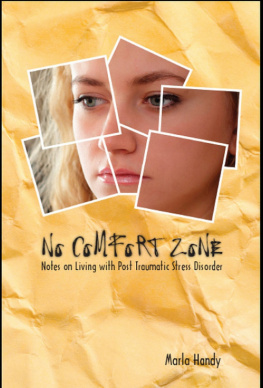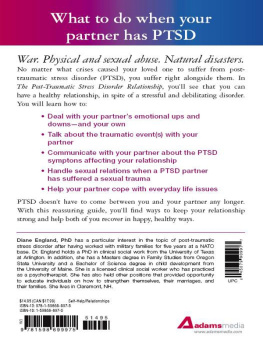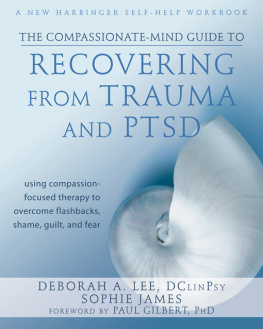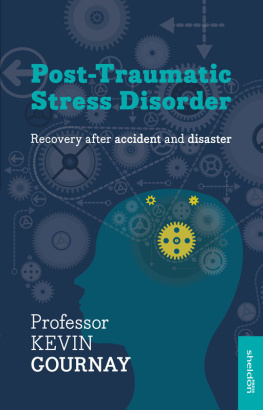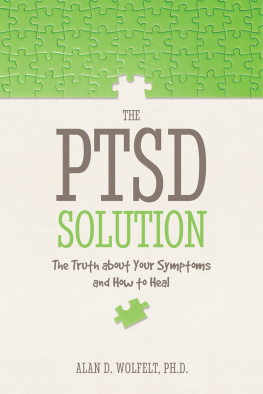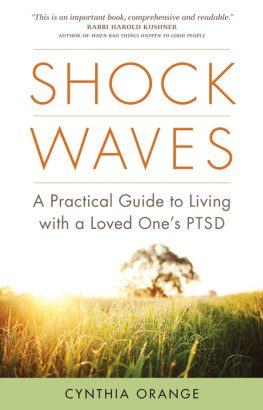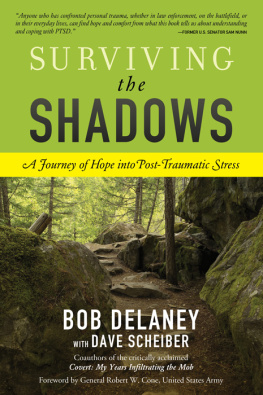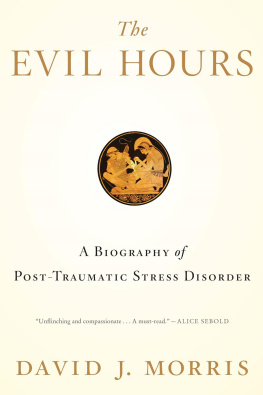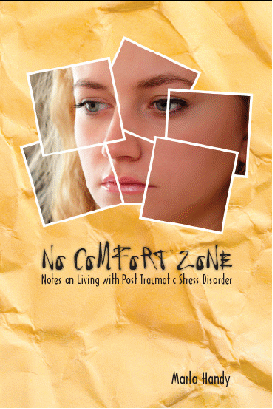
No Comfort Zone
Notes on Living with Post Traumatic StressDisorder
By Marla Handy
Published by Mocassa Press at Smashwords
Copyright 2010 By Marla Handy
Mocassa Press, PO Box 45355, Madison, WI53744, USA
This book is available in print at mostonline retailers.
All rights reserved.
Smashwords Edition, License Notes
This ebook is licensed for your personalenjoyment only. This ebook may not be re-sold or given away toother people. If you would like to share this book with anotherperson, please purchase an additional copy for each recipient. Ifyoure reading this book and did not purchase it, or it was notpurchased for your use only, then please return to Smashwords.comand purchase your own copy.
This book is dedicated to everyone whobelieves that she or he is the only one. Youre not.
Table of Contents
This is not a memoir. I dont know you wellenough for that.
In fact, Im not sure I know my own past wellenough for that.
This is about my today, my every day. I wantyou to know something about what its like to live my life. I oftendont react to lifes events like most of you, and the roots of myreactions arent obvious.
I have post-traumatic stress disorder (PTSD),a condition most often associated with war veterans. Unfortunately,it is also prevalent here on the home front, among those of us whohave seen the really ugly side of life: sex abuse, rape, captivity,exploitation, the threat of harm to loved ones. We become damagedin the same way. It just tends to take us longer to getdiagnosed.
My condition is the result of experiencing anextreme, but very real, slice of humanity. The consequences arelasting. Im writing this because I want you to know me and mymessiness and, as a result, know that you also come in contact withthis slice of humanity. You live among those who create themessiness, and those of us who are marked by it. Ugliness is notconned to sensational news stories and hushed gossip. It wandersthrough our daily lives, but those of you with a choice often donot see it.
I dont have that choice.
I see it. Or sense it. Or fear it. Andsometimes I react in ways that are hard to explain and evenembarrassing. This is what I always considered to be mymessiness.
It took me years to gure out that it isPTSD.
I dont know you well enough to tell you allthe gritty details of my life, but I do want you to know me better.And I want you to know what Ive learned about PTSD.
This isnt a self-help book. I dont claim tohave any answers or magic wands. All I have to offer is a windowinto one life. But maybe a glimpse through this window, framed byan understanding of PTSD, will make it easier to recognize thiskind of messiness when you see it.
And that would make me feel less alone.
But then, feeling isolated is a symptom ofPTSD.
~ ~ ~
Trauma, by denition, is horrifying and tosome extent disrupts the lives of any who experience it. But, forsome of us, trauma permanently alters our being. Our biology andemotional reactions to the world are changed in measurable,physical ways.
It pushes us through the looking glass.
This is post-traumatic stress disorder. Thesymptoms include reexperiencing the traumatic event(s) in differentways, hyperarousal that can take various forms, avoidance of thingsthat are associated with the event(s) and feelings of emotionalnumbness. Other symptoms can include suicidal thoughts or substanceabuse. It often comes with a sense of shame or guilt for either nothaving prevented the trauma or surviving it when others didnot.
Although those of us with PTSD may also havedepression at times, PTSD is not the same as depression. In fact,it is classied as an anxiety disorder, one that can forever changehow the body reacts to the world.
PTSD is now believed to come in two avors,regular and complex. These are separate from the categories ofacute (symptoms lasting six months or less) and chronic (symptomslasting more than six months, often a lifetime).
Regular PTSD is usually the result ofexperiencing a single traumatic event or episode such as a rape, acar accident, a natural disaster or witnessing a murder. The traumaof these events includes the very real belief that one might notsurvive. Most soldiers who have PTSD have this type. Even thoughthey may have experienced traumatic stress over the length of theirdeployment, the trauma was still isolated from their reallives.
People with regular PTSD just want to getback to where they were, to what was once their real life. Whenthey could relax. When they were innocent.
They wish they didnt know now what theydidnt know then.
Those with complex post-traumatic stressdisorder (C-PTSD) have lost more than their sense of safety orcontrol in the world. Their sense of personhood and personalintegrity has also been violated or stunted. People with C-PTSDeither never had a then a time before things got bad or theirearlier experience was overcome by having real life becomecontinuously traumatic. This applies to people who have been underthe complete control of others for an extended period of time.Captives, hostages, kids trapped in sex rings, POWs, those caughtin life-threatening domestic abuse situations and victims ofchildhood abuse and sexual abuse usually fall into thiscategory.
People with complex post-traumatic stressdisorder not only have symptoms of PTSD, which can be veryconfusing, but theyre also not quite sure of their own identities,because the trauma crushed their sense of being an individual witha right to choice and expression.
Traumatic events might shatter ones sense ofcontinuity in the world, but continuously conforming to the demandsof an oppressor can shatter ones sense of continuity as a person.When this sort of trauma happens to kids, they can have a hard timedeveloping a solid sense of personhood at all. They dont losethemselves because they never formed a cohesive sense of self.
When people with either type of PTSD have abefore to reference, they may never be exactly who they werebefore the trauma, but they know they did function at one point.They know they have that capacity. They may be scattered all overthe place, but they know that all the parts are there.
Kids who grew up with no before referencemay not even know what parts they need, so they make them up asthey go along. They dont know how to just be yourself. Thatsense of making it up comes with the insecurity of being foundlacking on a very deep level. And with that comes the potential ofvery deep shame.
Complex PTSD is not yet an ofcially accepteddiagnosis, which means experts in the eld have not agreed upondiagnostic criteria, so insurance companies wont pay for itstreatment. For the time being, people who exhibit symptoms beyondthose identied for PTSD and not otherwise categorized, can bediagnosed with the lovely term DESNOS: Disorders of Extreme StressNot Otherwise Specied.
~ ~ ~
I am ofcially diagnosed with chronic PTSD,but strongly relate to some aspects of complex PTSD.
Mine wasnt just a run-of-the-milldysfunctional family. The quick and dirty story is that my motherwas often psychotic and was diagnosed as schizophrenic. My fatherwas never ofcially diagnosed with anything other than gout. But,at a minimum, he was a nasty alcoholic. For me, my psychotic motherwas the safer and more stable parent.
I experienced unpredictable abuse andneglect. I was sexually abused as a very young child. I wasterrorized by my father for a number of years. And I experienced alife-threatening assault and rape by a stranger when I was in myearly twenties.
Next page
